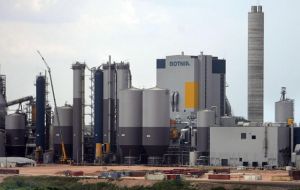MercoPress. South Atlantic News Agency
Sour anniversary for Botnia pulp mill Argentine pickets
 The mill produces a million tons of pulp annually
The mill produces a million tons of pulp annually An Argentine company has purchased 500 tons of pulp from the Uruguayan Botnia mill which is at the heart of a serious diplomatic controversy with Argentina that has reached the International Court of The Hague.
The news was revealed by a Uruguayan government financed newspaper on the week of the third anniversary of the blocking by Argentine pickets of an international bridge linking the neighbouring countries in protest over the alleged contamination from the Botnia plant.
The first shipment of 500 tons, one of several, has already left Fray Bentos, Uruguay where the plant is located and is heading for the port of Nueva Palmira from where it will be shipped to Argentina.
In spite of the three-year pickets, the Botnia plant this month begun its third year of production and the whole complex was recently sold to another Finnish corporation UPM, which has plans to diversity sales, mainly to its own paper plant in China and regionally.
Meantime across the bridge in Gualeguaychú pickets rallied for a dinner celebration and to reaffirm their commitment to continue blocking the bridge until the Botnia plant is relocated.
“The anniversary is a great commitment, a great effort and means a lot for all of us since we are not only defending sovereignty but also the environment and the model of production chosen by our city: tourism, organic agriculture and wild life”, said Jorge Fritzler, one of the picket leaders organized as the Assembly.
The two neighbouring countries have clashed over the pulp mill because Argentina claims Uruguay never informed it had granted Botnia permission to build the plant which takes water from the jointly managed River Uruguay, based on a treaty dating back to 1975. Argentina also argues the plant contaminates and as part of its strategy at the time promoted the pickets.
Uruguay insists Argentina was informed both formally and informally about the different steps and has repeatedly proven that the plant does not contaminate and has been built following the strictest European Union standards.
Nevertheless Argentina took its case to the International Court of The Hague which is scheduled to rule on the dispute early next year.
“No matter The Hague’s ruling protests will continue until Botnia is relocated; if the ruling is favourable, excellent and it’s the end of the pickets. However if not, we will continue with our struggle” promised Fritzler.
“We reject the Argentine company trading with Botnia. It’s a lack of ethics and consideration given the court case where Uruguay is accused of not having honoured a bilateral agreement and besides Botnia contaminates the river. It’s totally unacceptable that an Argentine company should be ‘feeding’ Botnia”, underlined Fritzler.
According to a recent public opinion poll, 83% of Gualeguaychú residents support the pickets and the bridge blocking. Very few reject it and have formed another organization interested in keeping the three bridges linking Argentina with Uruguay open and operational given the significant border trade.
However a national poll covering the whole of Argentina shows 60% in favour of lifting the blockade and a similar percentage support the fact the case was taken to the International Court of The Hague.




Top Comments
Disclaimer & comment rulesCommenting for this story is now closed.
If you have a Facebook account, become a fan and comment on our Facebook Page!